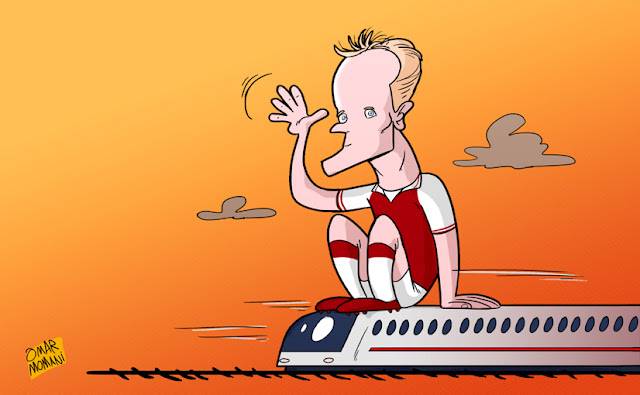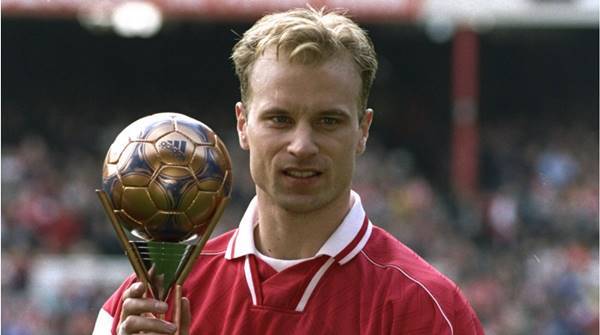Dennis Bergkamp – The Non-Flying Dutchman
Dennis Bergkamp, born on May 10, 1969, is celebrated as one of the finest footballers of his era. Known for his exceptional technical skills and vision, Bergkamp’s illustrious career includes three Premier League titles and a UEFA Cup with Arsenal. Honored as Dutch Footballer of the Year in 1991 and 1992, he was also a Ballon d’Or runner-up in 1993 and placed third for FIFA World Player of the Year in 1993 and 1997. This narrative delves into the intriguing story of Bergkamp, famously dubbed “The Non-Flying Dutchman,” due to his aviophobia.
Dennis Bergkamp’s Football Brilliance
Dennis Bergkamp wasn’t just a typical striker; he was a technical wizard with a keen scorer’s eye. Renowned for his exquisite touch, he controlled the ball with seemingly magical finesse. His ability to find killer passes unseen by others and finish with either elegance or power set him apart. Bergkamp’s creativity and composure on the field were unparalleled, blending artistry with efficiency. His legendary status was cemented by moments of genius, such as his iconic goals against Newcastle and Argentina, which continue to inspire fans and players alike. His style, marked by intelligence and grace, redefined forward play and left an indelible mark on the football world.

Bergkamp and Fear of Flying
Despite his stellar football career, Dennis Bergkamp’s fear of flying, known as aviophobia, significantly impacted his professional life. This intense fear began in 1994 following a traumatic incident during a flight with the Dutch national team, where a journalist jokingly mentioned having a bomb. This event triggered a profound anxiety around flying that Bergkamp could never fully overcome, despite seeking help from psychologists and attempting to fly with his family (Arsenal Station) (Sporting Tribune).
Bergkamp’s aviophobia had substantial repercussions on his career. It limited his ability to travel with his team for away games, particularly affecting his participation in important matches. For instance, Arsenal had to manage without him during critical European fixtures, such as their Champions League games in Kyiv and Donetsk, which were pivotal for the team’s progress (Arsenal Station) (Tribuna.com).

source: transfermarkt
Dennis Bergkamp The Non-Flying Dutchman
To cope with his fear, Bergkamp often traveled by car or train for domestic and European matches, accompanied by Arsenal’s kit man, Vic Akers. This arrangement allowed him to maintain his performance levels without compromising his mental well-being, showcasing his dedication and resilience despite this significant hurdle (Tribuna.com).
Despite his fear of flying, Bergkamp’s talent and ability on the pitch have never been in doubt. He has been praised for his exceptional technical ability, his vision and creativity, and his clinical finishing. His skill with the ball at his feet earned him the nickname “The Non-Flying Dutchman” among Arsenal fans.
His dedication was a masterclass in resilience. The ‘Non-Flying Dutchman’ became a global icon, his artistry on the field transcending earthly limitations. From Amsterdam to Arsenal, Bergkamp painted masterpieces with his boots, silencing doubters and etching his name in footballing folklore.
Bergkamp’s fear of flying is a reminder that even the most successful and accomplished individuals can struggle with anxiety and phobias. It is also a testament to the determination and resilience of the human spirit, as Bergkamp has continued to overcome his fear to play at the highest levels of professional football.

Here are some facts about Dennis Bergkamp:
- He was born in Amsterdam, Netherlands, on May 10, 1969.
- He made his professional debut for Ajax in 1986.
- He moved to Inter Milan in 1993.
- He joined Arsenal in 1995.
- He retired from football in 2006.
Dennis Bergkamp is widely regarded as one of the greatest Dutch footballers of all time. His illustrious career has earned him numerous accolades, including induction into both the Premier League Hall of Fame and the Italian Football Hall of Fame. Known for his exceptional technical skills, creativity, and composure, Bergkamp left an indelible mark on the footballing world. His contributions to Arsenal’s success and his influence on the game have solidified his legacy as a football legend. Bergkamp’s impact extends beyond his playing days, as he continues to inspire future.
Let’s close this article with one of the most beautiful goals of the Legend and honor him.
References:
- BBC Sport. “Bergkamp’s fear of flying.” September 3, 2002. https://www.bbc.com/sport/football/2225209
- The Guardian. “The Joy of Six: Dennis Bergkamp moments.” April 1, 2011. https://www.theguardian.com/sport/blog/2011/apr/01/joy-of-six-dennis-bergkamp-moments
- The Independent. “Bergkamp: the flying phobia that won’t go away.” April 20, 2006. https://www.independent.co.uk/sport/football/news-and-comment/bergkamp-the-flying-phobia-that-wont-go-away-475601.html
Images sources:
https://www.transfermarkt.com.tr/dennis-bergkamp/
https://omarmomani.blogspot.com/2016/05/dennis-bergkamp.html


